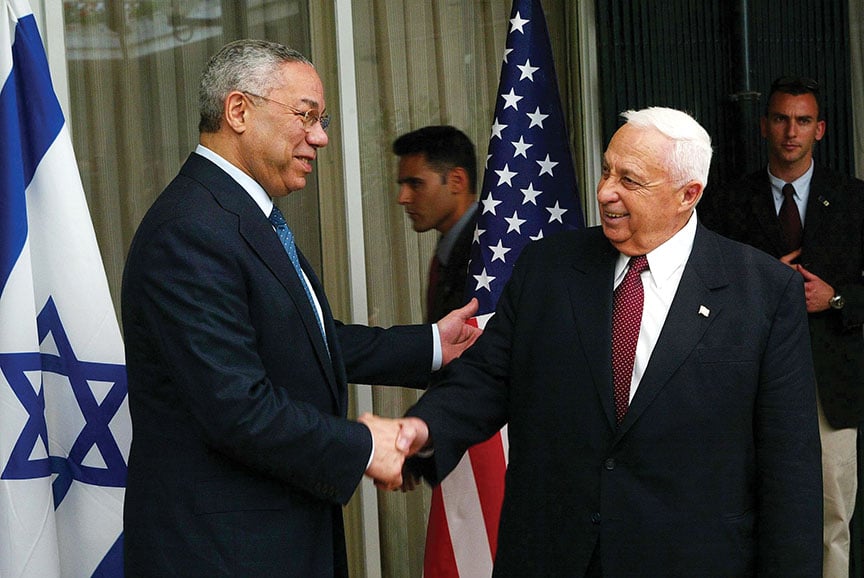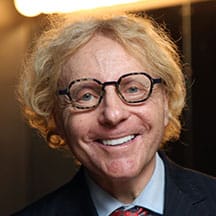
Colin Powell’s death this past week inspired testimonials of his many years of service as a military officer and American statesman. Jews largely appreciated the former Secretary of State for his support of Israel. He wasn’t averse, however, to criticizing the world’s one Jewish state.
Perhaps it was because long before he became a diplomat, Powell was quite familiar speaking with and for Jews. He literally spoke their language. Name another American secretary of state who knew Yiddish. Not even Henry Kissinger—or, for that matter, the current Secretary, Anthony Blinken—ever adopted what was the mother tongue for most Jews throughout the 20th century.
Powell was raised in a racially and ethnically-mixed enclave of urban New York. It wasn’t until he was a young solider, stationed in the south, that he witnessed the signature racism of Jim Crow. Before then, like many other racial and ethnic minorities (Powell’s parents were Jamaicans), he found brotherhood in the Bronx.
As a boy, he worked in both a shoe and a children’s furniture store owned by religiously observant, Yiddish-speaking Jews. A Black teenager was embraced by his Jewish employers, enough so that he spoke their language and came to know their ways.
Years later, as National Security Adviser, he greeted an Israeli admiral in Yiddish, “Vos macht a Yid?” The Israeli, however, spoke no Yiddish, and didn’t know how to reply. Powell sensed the humor in the moment, pointed at the Israeli and asked, “Iz doss a Yid?” (“Is this a Jew?”)
Powell surely knew when he was in the presence of Jews. He not only spoke Yiddish. He had also assisted Jews in the time-honored tradition as a Shabbos goy—performing tasks on Saturday that religious Jews cannot perform for themselves, such as turning off lights, shutting down stoves, turning up air-conditionings.
There was a time, before pre-programmed thermostats, timers and, nowadays, Smart Homes, when synagogues and Jewish families, in Europe and America, relied upon neighborly gentiles to fulfill this caretaker role.
Powell was not the lone celebrity—even among Black Americans—to have faithfully served in this capacity. Former Supreme Court Justice Thurgood Marshall also knew his way around Jewish holidays in Baltimore. Louis Armstrong, long before he became a jazz legend, was so grateful to the Lithuanian Jewish family for whom he worked in New Orleans (the mother sang Yiddish lullabies and the father helped him purchase his first instrument), he wore a Star of David for the rest of his life.
Elvis Presley’s family in Memphis shared an apartment house with an upstairs family whose patriarch fronted a band for Jewish-weddings. Elvis was obviously drawn to the Sabbath-observant guitar-picker who occasionally needed a hand from his young rockabilly neighbor—not as a bandmate, but as switch-turner. It’s not clear whether Presley officially qualified as a Shabbos goy. The latest genealogy on the King of Rock and Roll was that he was, himself, Jewish.
Maybe that’s why he graciously accepted that weekly gig.
Former New York Governor Mario Cuomo, an ethnic Italian, was a Shabbos goy for Jewish families in Queens. Journalist and Irish author Pete Hamill assumed this duty for Brooklyn Jews. His novel “Snow in August” features an Irish boy who speaks to the rabbi in Yiddish and knows what do to on Shabbat.
Supreme Court Justice Sonia Sotomayor grew up in a Bronx housing project and worked in a kosher bakery after school. A Puerto Rican teenager passed as a Jewish girl whose customers spoke Yiddish while ordering their babkas and challahs. Sotomayor never mistook one for the other.
In these bitterly divisive days where ethnic and racial groups are cynically, and politically, pitted against one another, it bears remembering that there was a time when immigrants and minorities believed they were all in it together. Today, Asians, and especially Jews, aren’t even allowed membership in the rainbow coalition. Punished for their success, demonized for their work ethic, blamed for Israel, and, worst of all, accused of leveraging their privilege and perpetuating racism.
In these bitterly divisive days where ethnic and racial groups are cynically, and politically, pitted against one another, it bears remembering that there was a time when immigrants and minorities believed they were all in it together.
There are simply too many strings attached to minority status these days.
It’s not as if diverse cities were once confused with an urban Eden. There were always turf wars, resentments, and grievances. Bigotry was not unknown in the New York boroughs. Cross the wrong street, look someone in the eye the wrong way, and you’d likely hear a curse word reserved for your people. But uttering a rotten slur didn’t get anyone banished from the Big Apple.
Multi-cultures were very different from today’s “cancel culture.” These are much more unforgiving times.
That’s why in the PC-censoring climate in which we find ourselves, one wonders whether “Shabbos goy” is a denigration that demands a trigger warning.
After all, we’re all ripe for reflexive insult. Indignation is everywhere. Moral outrage is the new ethic. We’re told that haters lurk among us. America is one vast intersecting Venn Diagram of shared antagonism.
With such a low opinion of one another, no wonder patriotism is at an all-time low.
Which is why the death of Colin Powell—esteemed Black American and former Shabbos goy—should invite a national conversation about belonging in America. When did we decide that no one was beyond suspicion or deserving of the benefit of the doubt? Where did all the welcome mats go?
When did we decide that no one was beyond suspicion or deserving of the benefit of the doubt? Where did all the welcome mats go?
Powell wouldn’t have acknowledged once being a Shabbos goy if it was tantamount to the “N-word.” Cuomo wouldn’t have recalled his Saturday job for local Jews with the fondness of a paper route. Hamill wouldn’t have written a novel where an amiable Irish boy takes on the task of a Jewish surrogate.
Actually, there’s a certain romanticism about the Shabbos goy, a metaphor for a melting pot frozen in time, immersion that didn’t erase identity, language barriers that would not prevent neighbors from knowing one another.
There’s nothing similarly romantic or evocative about “wokeism”—with its pathological fixation on oppression and privilege, blame and irreversible guilt. America was always a nation teeming with differences but demanding acceptance. We fought a Civil War to right a wrong. Now we seem to be fighting another one, but for less noble reasons.
Handing over the keys to Jewish homes and synagogues to obliging neighbors required trust. We now have the technology that makes simple tasks requiring human hands obsolete. But that shouldn’t preclude a longing to unite in a common cause rather than loathe a common oppressor.
Thane Rosenbaum is a novelist, essayist, law professor and Distinguished University Professor at Touro College, where he directs the Forum on Life, Culture & Society. His work has appeared in major national and global publications. He is the legal analyst for CBS News Radio and appears frequently on cable TV news programs. His most recent book is titled “Saving Free Speech … From Itself.”


































 More news and opinions than at a Shabbat dinner, right in your inbox.
More news and opinions than at a Shabbat dinner, right in your inbox.